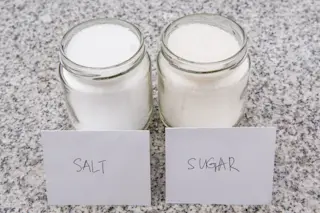Conventional wisdom: Sodium consumption causes high blood pressure and heart disease, so we should eat less salt.
Contrarian view: Added sugars are more to blame for high blood pressure and heart disease, so we should reduce them instead of sodium.
High blood pressure, or hypertension, is the leading cause of America’s No. 1 killer of both women and men: heart disease. Studies have shown that reducing sodium can help control blood pressure, and since the late 1970s, the government and physicians have preached skipping the salt to cut our heart disease risk.
But surprisingly, reducing just sodium isn’t all that effective at dropping blood pressure. “Sodium intake is only one — and for most people not necessarily a large — factor in chronic hypertension,” says Hillel Cohen, co-executive editor of the American Journal of Hypertension and a clinical epidemiology and population health professor at the Albert Einstein College of Medicine. ...














